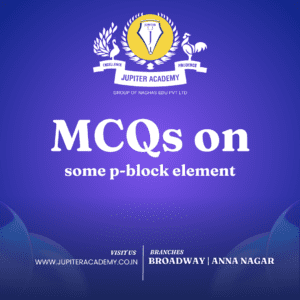NEET mcqs on some p-block elements

The p-block elements are a very important topic in the NEET exam, accounting for about 12-16 marks. They are also a very diverse group of elements, including metals, metalloids, and nonmetals. Some of the most important p-block elements for the NEET exam include:
Thank you for reading this post, don't forget to subscribe!- Carbon: Carbon is the basis of all life on Earth, and it is also one of the most versatile elements known. It is used in a wide variety of industries, including plastics, pharmaceuticals, and construction.
- Silicon: Silicon is the second most abundant element in the Earth’s crust, and it is the main component of sand and quartz. It is also used in the production of semiconductors, which are essential components of computers and other electronic devices.
- Boron: Boron is a metalloid that is used in a variety of applications, including detergents, fertilizers, and glassmaking. It is also an important nutrient for plants and animals.
- Aluminum: Aluminum is a lightweight and durable metal that is used in a wide variety of products, including aircraft, cans, and foil. It is also a good conductor of electricity and heat, making it useful in electrical applications.
- Nitrogen: Nitrogen is a major component of the Earth’s atmosphere, and it is also an essential nutrient for plants and animals. It is used in the production of fertilizers, explosives, and plastics.
- Oxygen: Oxygen is the third most abundant element in the universe, and it is essential for life. It is used in a variety of medical and industrial applications, including welding, ozone depletion repair, and air purification.

Here are some multiple-choice questions (MCQs) on p-block elements along with their answers:
**1. Which group of the periodic table primarily contains p-block elements?**
a) Group 1
b) Group 14
c) Group 18
d) Group 3
**Answer: b) Group 14**
**2. Which p-block element is the most abundant in the Earth’s crust?**
a) Nitrogen
b) Oxygen
c) Silicon
d) Phosphorus
**Answer: c) Silicon**
**3. Which of the following is a noble gas?**
a) Neon
b) Nitrogen
c) Nickel
d) Sodium
**Answer: a) Neon**
**4. What is the general electronic configuration of p-block elements?**
a) ns^2np^1-6
b) ns^2np^2-7
c) ns^2np^3-8
d) ns^2np^4-9
**Answer: b) ns^2np^2-7**
**5. Which p-block element is essential for plant growth and is often used in fertilizers?**
a) Oxygen
b) Sulfur
c) Phosphorus
d) Chlorine
**Answer: c) Phosphorus**
**6. Which p-block element is a major constituent of organic compounds and is essential for life?**
a) Nitrogen
b) Fluorine
c) Boron
d) Carbon
**Answer: a) Nitrogen**
**7. Which p-block element is known for its high electrical conductivity and is often used in semiconductors?**
a) Boron
b) Silicon
c) Sulfur
d) Neon
**Answer: b) Silicon**
**8. What is the most common oxidation state of halogens in their compounds?**
a) +1
b) +2
c) -1
d) 0
**Answer: c) -1**
**9. Which p-block element is used in the production of fertilizers and explosives and is often called “white phosphorus”?**
a) Phosphorus
b) Nitrogen
c) Sulfur
d) Oxygen
**Answer: a) Phosphorus**
**10. Which p-block element is a halogen and is commonly used as a disinfectant and for water purification?**
a) Chlorine
b) Fluorine
c) Bromine
d) Iodine
**Answer: a) Chlorine**
These questions should help you test your knowledge of p-block elements.
JEE mcqs on some p-block elements
Here are some JEE mains multiple-choice questions (MCQs) on p-block elements, along with their answers:
**Question 1:** Which of the following elements is a noble gas?
A) Oxygen (O)
B) Fluorine (F)
C) Neon (Ne)
D) Sodium (Na)
**Answer 1:** C) Neon (Ne)
**Question 2:** Which p-block element is commonly found in fertilizers and is essential for plant growth?
A) Nitrogen (N)
B) Phosphorus (P)
C) Sulfur (S)
D) Chlorine (Cl)
**Answer 2:** B) Phosphorus (P)
**Question 3:** Which of the following elements is used as a disinfectant in swimming pools and water treatment?
A) Oxygen (O)
B) Hydrogen (H)
C) Chlorine (Cl)
D) Fluorine (F)
**Answer 3:** C) Chlorine (Cl)
**Question 4:** Which p-block element is a major component of Earth’s atmosphere?
A) Nitrogen (N)
B) Carbon (C)
C) Oxygen (O)
D) Helium (He)
**Answer 4:** A) Nitrogen (N)
**Question 5:** Which p-block element is known for its wide variety of allotropes, including graphite and diamond?
A) Carbon (C)
B) Silicon (Si)
C) Boron (B)
D) Nitrogen (N)
**Answer 5:** A) Carbon (C)
**Question 6:** Which p-block element is used as a semiconductor in electronic devices like transistors?
A) Boron (B)
B) Aluminum (Al)
C) Silicon (Si)
D) Sulfur (S)
**Answer 6:** C) Silicon (Si)
**Question 7:** Which p-block element is a key component of organic molecules and is essential for life?
A) Nitrogen (N)
B) Phosphorus (P)
C) Sulfur (S)
D) Neon (Ne)
**Answer 7:** A) Nitrogen (N)
**Question 8:** Which p-block element is known for its unique ability to form compounds with all other elements?
A) Oxygen (O)
B) Hydrogen (H)
C) Fluorine (F)
D) Carbon (C)
**Answer 8:** B) Hydrogen (H)
**Question 9:** Which p-block element is commonly used in batteries due to its high electrochemical potential?
A) Sulfur (S)
B) Oxygen (O)
C) Chlorine (Cl)
D) Lithium (Li)
**Answer 9:** D) Lithium (Li)
**Question 10:** Which p-block element is a halogen and exists as a diatomic gas under normal conditions?
A) Fluorine (F)
B) Chlorine (Cl)
C) Bromine (Br)
D) Iodine (I)
**Answer 10:** A) Fluorine (F)
These questions cover various aspects of p-block elements and their properties. Feel free to ask if you have any more specific questions or need further explanations!
In addition to these individual elements, the NEET exam also covers a variety of p-block compounds, such as:
- Carbon dioxide: Carbon dioxide is a greenhouse gas that is responsible for climate change. It is also used in the production of carbonated beverages and dry ice.
- Water: Water is essential for life, and it is also used in a variety of industrial and agricultural applications.
- Ammonia: Ammonia is a colorless gas that is used in the production of fertilizers and explosives.
- Nitric acid: Nitric acid is a strong acid that is used in the production of fertilizers, explosives, and plastics.
- Sulfuric acid: Sulfuric acid is the most important industrial chemical in the world. It is used in a wide variety of applications, including the production of fertilizers, plastics, and detergents.
neet mcqs on some p-block elements neet mcqs on some p-block elements neet mcqs on some p-block elements neet mcqs on some p-block elements neet mcqs on some p-block elements neet mcqs on some p-block elements neet mcqs on some p-block elements neet mcqs on some p-block elements neet mcqs on some p-block elements neet mcqs on some p-block elements
jee mcqs on some p-block elements jee mcqs on some p-block elements jee mcqs on some p-block elements jee mcqs on some p-block elements jee mcqs on some p-block elements jee mcqs on some p-block elements jee mcqs on some p-block elements jee mcqs on some p-block elements jee mcqs on some p-block elements jee mcqs on some p-block elements jee mcqs on some p-block elements


